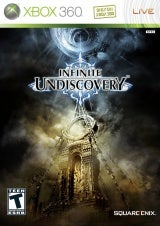In fact, you don't want to give up control of Capell too often, because everything in Infinite Undiscovery takes place in real-time, including the combat. You can't even access your inventory without risking a sneak attack from a lurking enemy. And considering that enemies have the ability to sneak up on you stealthily, that's an ever-present concern. Fortunately, if you're crafty, you can return the favor and whack them before they know what's happening.
Capell's only attacks are strong and weak swings of his weapon. These attacks can be chained together into simple combos that end with a more powerful finishing strike. Depending on where and how you hit your enemies with the combo strikes, you can restore attack or magic power or boost other party stats.
A quick press of the Y button calls for party members to heal their injured companions. This auto-heal function usually works very well, although sometimes it takes a couple of seconds for your healer to disengage from combat and perform the healing. The AI generally makes spot-on decisions about who to heal first, and whether to use an item or a spell to do so. It's so good that it almost negates the need to parry, which requires precise timing and distracts you from offense while you wait for the perfect moment to pull the parry trigger.
Who Are You Again?
A major weakness of the game is its awkward character management system. At the start, when you only have two or three characters to manage, it's fine, but by the end of the adventure you have access to nearly 20 characters. The plethora of playable characters sounds like a good idea on paper, but in practice, it just doesn't work. In the approximately 30 hours of gameplay, there's simply not enough time to get a feel for every character.
Not only does that hurt the storytelling aspect of the game, it also makes it difficult to master the gameplay. With a dozen and a half characters under your control, each with their own unique skills and abilities, you practically need a flowchart or strategy guide to keep everyone straight. It's obvious that no small amount of effort was put into the character designs and their abilities, but unfortunately, it's no small amount of effort to manage them either. Half as many characters would have worked twice as well.
At various points in the game, you're simultaneously controlling multiple groups of characters, and by the time you reach this point, it's practically impossible to effectively manage your inventory or easily swap out party members. You'll find yourself equipping characters with inferior weapons and items, just because it's such a pain to assign the best gear to all of your characters. This could have been avoided with the inclusion of an option to automatically equip the best available weapons and items, but that's a feature that's sadly lacking.
Infinite Undiscovery's greatest weakness is that it feels too much like other, better JRPGs, many of which were also developed by tri-Ace. However, in a strange way, that's also its greatest strength. If you're just looking for a JRPG fix, there's no reason not to pick up Infinite Undiscovery. It's a solid title by a veteran developer, with enough gameplay to justify the cost of admission. Granted, it's not likely to hold a great deal of appeal for those who weren't already JRPG fans, and it's not going to be the crossover smash that brings a ton of fans to the genre. But if you're already a fan of Valkyrie Profile, Star Ocean, and tri-Ace's other venerable franchises, Infinite Undiscovery probably deserves a few hours of your time and a spot on your RPG shelf.





